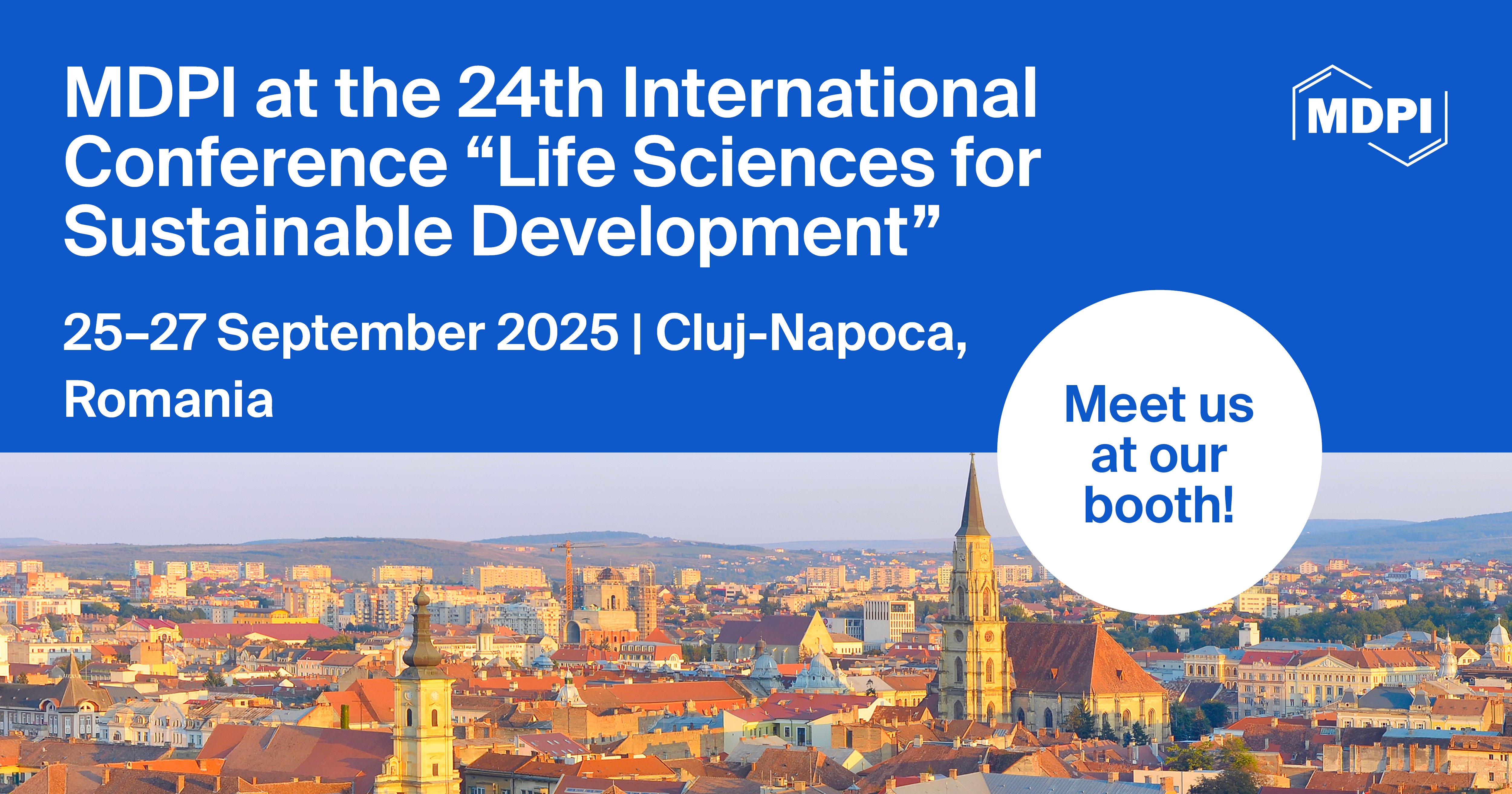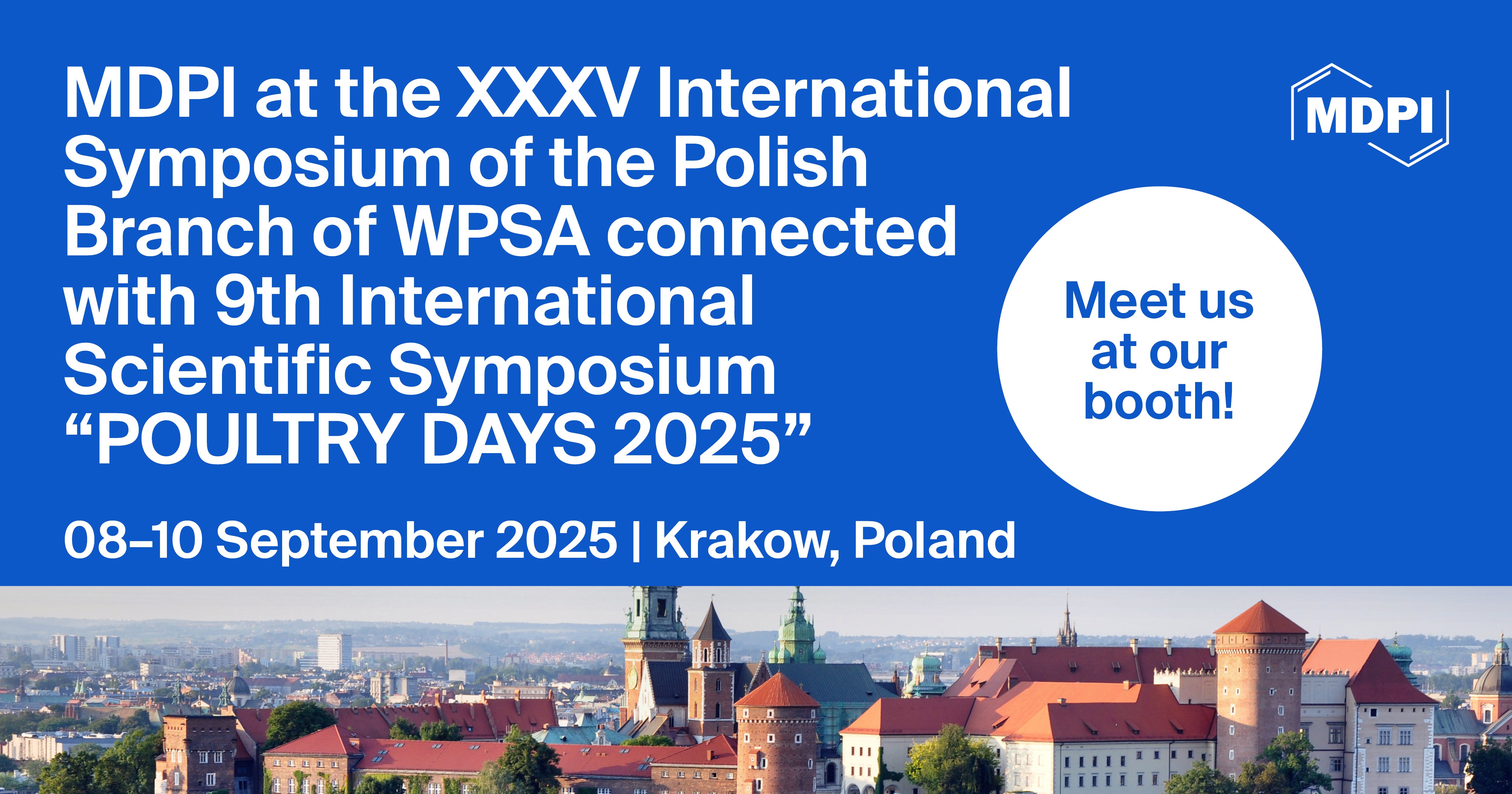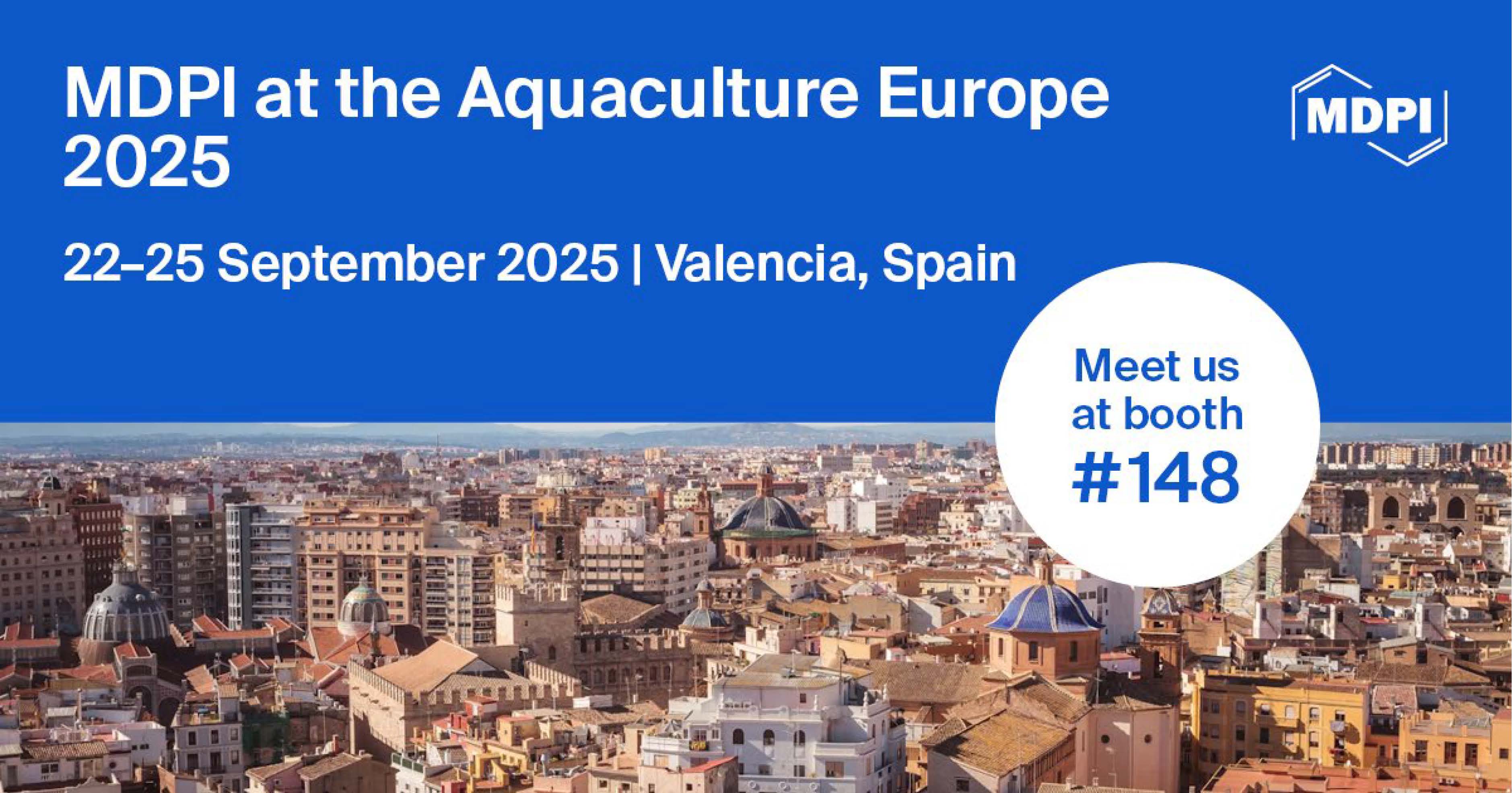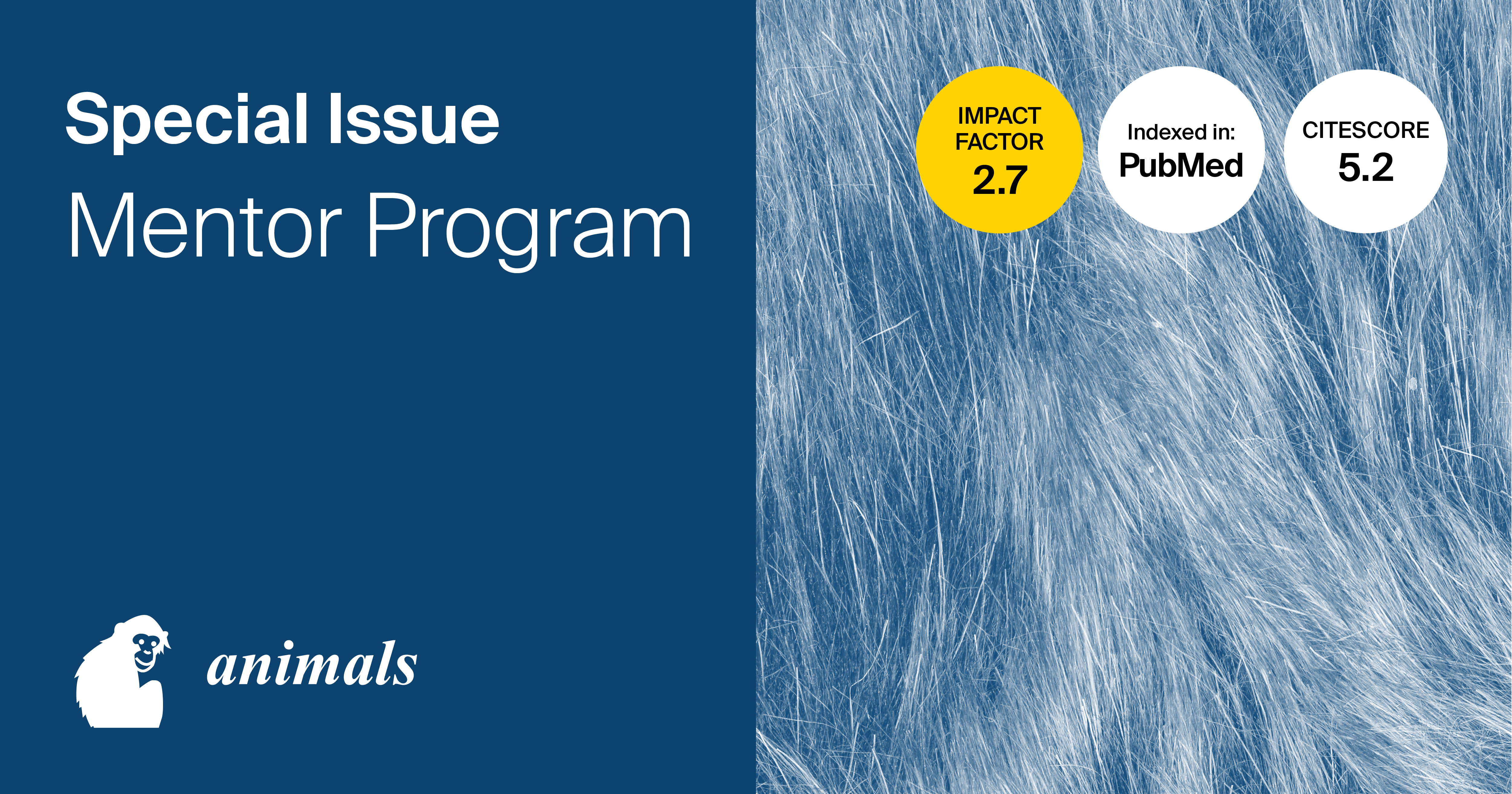
Journal Menu
► ▼ Journal Menu-
- Animals Home
- Aims & Scope
- Editorial Board
- Reviewer Board
- Topical Advisory Panel
- Instructions for Authors
- Special Issues
- Topics
- Sections & Collections
- Article Processing Charge
- Indexing & Archiving
- Editor’s Choice Articles
- Most Cited & Viewed
- Journal Statistics
- Journal History
- Journal Awards
- Society Collaborations
- Conferences
- Editorial Office
Journal Browser
► ▼ Journal BrowserNeed Help?
Announcements
3 September 2025
Join Us at the MDPI at the University of Toronto Career Fair, 23 September 2025, Toronto, ON, Canada

Date: 23 September 2025
Time: 11:00 a.m.–4:30 p.m
Location: The Chelsea Hotel, 33 Gerrard Street West, Toronto
MDPI is thrilled to announce our participation in the University of Toronto’s largest career fair, taking place at the St. George Downtown Campus. This exciting event brings together thousands of students, graduates, and professionals looking to connect with top employers and explore career opportunities.
We invite all attendees to visit the MDPI booth to discover how you can be part of one of the world’s leading open access academic publishers. Whether you are passionate about scientific research, editorial work, marketing, or supporting global innovation in publishing, we want to meet YOU!
What to expect at our booth:
- Learn more about MDPI’s mission and global impact;
- Explore exciting career opportunities in publishing, editorial, communications, and more;
- Network with our team and ask questions about working at MDPI.
Whether you’re just starting your career or looking to take the next step, don’t miss this opportunity to connect with MDPI. Bring your resume, your curiosity, and your questions—we look forward to seeing you there!
For additional information on the Career Fair and Open MDPI positions, please visit the following links:
3 September 2025
Meet Us at the 24th International Conference “Life Sciences for Sustainable Development”, 25–27 September 2025, Cluj-Napoca, Romania

Conference: 24th International Conference “Life Sciences for Sustainable Development”
Date: 25–27 September 2025
Location: University of Agricultural Sciences and Veterinary Medicine, Cluj-Napoca, Romania
Join us for the 24th International Conference “Life Sciences for Sustainable Development,” taking place from 25 to 27 September 2025!
Organized by the University of Agricultural Sciences and Veterinary Medicine of Cluj-Napoca—one of Romania’s top “advanced research” universities, which is recognized by both national authorities and the European University Association—this prestigious event offers a dynamic platform for sharing scientific advancements, innovative ideas, and interdisciplinary research in agriculture, environmental protection, food science, biotechnology, veterinary medicine, and related fields. Featuring lectures from leading international and national experts, alongside oral and poster presentations, the conference supports global research priorities such as the EU’s Horizon 2020 and Romania’s national research programs.
Do not miss out—the eight thematic sessions will span the breadth of life sciences, and participants can present abstracts in the “Book of Abstracts” or submit peer-reviewed full papers for publication in the Bulletin of UASVM-CN. Register now and be part of this growing regional initiative!
The following open access journals will represent MDPI at the conference:
- Poultry;
- Dairy;
- Aquaculture Journal;
- Animals;
- Ruminants;
- International Journal of Molecular Sciences;
- Foods.
1 September 2025
MDPI INSIGHTS: The CEO's Letter #26 - CUJS, Head of Ethics, Open Peer Review, AIS 2025, Reviewer Recognition

Welcome to the MDPI Insights: The CEO's Letter.
In these monthly letters, I will showcase two key aspects of our work at MDPI: our commitment to empowering researchers and our determination to facilitating open scientific exchange.
Opening Thoughts

Society of China University Journals (CUJS) visit to MDPI Basel
In August, we had the pleasure of welcoming a delegation from the Society of China University Journals (CUJS) to our Basel headquarters. The visit was part of CUJS’s broader European tour, which included meetings with several major publishing organizations.
Purpose of the visit
The delegation’s stop in Basel involved an introductory meeting and knowledge-sharing with a view to identifying potential collaboration opportunities with MDPI. The CUJS team shared an overview of the Chinese scientific publishing landscape, including recent policy developments, and gave us insights into the journals and services they operate across China’s academic institutions.
MDPI presentations
We used the opportunity to introduce CUJS to MDPI’s mission, structure, and recent achievements. I presented on the latest developments at MDPI and our role in supporting global open access, addressing many follow-up questions from the delegation. Warm thanks are due to the following colleagues for their contributions to the session:
- Liliane Auwerter (Conference Organizer, Scientific Officer and Sustainability Specialist) shared an overview of our editorial process, including the quality indicators we use to track peer-review performance.
- Renato Merki (Publication Ethics Assistant) presented on behalf of our Research Integrity and Ethics team, emphasizing our commitment to responsible publishing.
- Silvano Bonfatti (Product Manager) introduced the JAMS platform, highlighting how it supports efficient journal management for editors and publishers alike.
- Aimar Xiong (Publisher, Section Managing Editor) and Giuliano Braccini (Office Manager) facilitated the meeting, offering clarity in response to specific questions, building the relationship during and beyond the meeting itself.
“Building relationships with organizations such as CUJS allows us to increase our visibility and reputation”
Why is this important?
China is one of the world’s largest producers of scientific research, with its universities and research institutes playing a key role in global scholarly publishing. Building strong relationships with influential organizations such as CUJS allows us to increase our visibility and reputation vis-à-vis the Chinese academic community, share best practices, learn from differing publishing models, and explore collaborations that have the potential to enhance the quality, reach, and diversity of our journals.
Looking ahead
It was a productive and friendly exchange that reflected our shared commitment to advancing scholarly communication and improving journal publishing practices. We value these visits, which allow us to create collaborations with stakeholders in the global academic community.
Our Basel office is a hub for hosting international delegations, partners, and collaborators. We look forward to creating more global connections that support our mission.
Impactful Research

Appointment of Dr. Tim Tait-Jamieson as Head of Publication Ethics
As part of our ongoing commitment to research integrity and publishing excellence, I am delighted to announce that we have appointed Dr. Tim Tait-Jamieson as Head of Publication Ethics.

In this role, Tim will lead the development of our ethics strategy and oversee the continued growth of the Publication Ethics Department, which is based across our offices in Basel, Manchester, Belgrade/Novi Sad, and Cluj. Guided by the principles of effective prevention and efficient resolution, the department plays an essential role in ensuring the highest standards of integrity throughout our editorial processes.
Department focus
Working closely with internal teams and external partners, the Publication Ethics Department focuses on refining our policies, aligning our operations with international best practices, and addressing complex cases with fairness and transparency. This work is critical in supporting our editors, reviewers, and authors, reinforcing MDPI’s contribution to the global dialogue on research integrity.
“Research integrity is something to which we all contribute through our daily work at MDPI”
About Tim
Tim joined MDPI in 2021 and has held several roles within the Publication Ethics Department, most recently serving as Research Integrity Lead. Based in our Basel office, he brings a strong academic background, with a Ph.D. in Geography from the University of Fribourg, Switzerland, and a proven track record of leadership in research integrity.
Research integrity is something to which we all contribute through our daily work at MDPI. I look forward to Tim’s leadership as we continue investing in the people, processes, and partnerships that uphold the trust and credibility of scholarly publishing.
Read more:
Inside MDPI

How and why MDPI offers Open Peer Review
At MDPI, we are committed to advancing openness and transparency in scholarly publishing. One area where we’ve taken a leadership role is peer review. Since 2014, MDPI has offered authors the option of open peer review, giving them the opportunity to publish reviewer comments alongside their papers. Each year, more authors are choosing this path, helping to build trust in the editorial process and provide valuable context for the research we publish.

Jack McKenna (Senior Content Specialist, MDPI) recently wrote an informative piece looking at the impact and importance of open peer review at MDPI. He highlights how this approach not only benefits readers but also gives well-deserved recognition to our reviewers, who generously dedicate their time and expertise to the academic community.
I encourage you to read this blogpost to see how MDPI is helping set standards for transparency in scholarly publishing.
Coming Together for Science

Recap of MDPI’s AIS 2025 Conference in Kuala Lumpur
Entering the month of August, we held The 2nd International Conference on AI Sensors and Transducers (AIS 2025) in Kuala Lumpur, Malaysia.
“AIS is quickly becoming a premier event in the field”

The second edition of AIS brought together 335 attendees from across Asia and beyond, including participants from China, Japan, Korea, and Southeast Asia. The event, chaired by Prof. Dr. Toshihiro Itoh (University of Tokyo), Prof. Dr. Sang-Woo Kim (Yonsei University), and Prof. Dr. Chengkuo Lee (National University of Singapore), continues to grow in reputation and has become an important platform for researchers and students to present their work, exchange ideas, and build international collaborations.
AIS is quickly becoming a premier event in the field, with participants highlighting its quality of service, its expanding academic network, and the value it delivers in the context of tightening research budgets in the region.
It was also excellent to see our new MDPI journal AI Sensors, which originated from a conference topic, host a successful launch party at the event.
Highlights from participant feedback:
- Southeast University (China) sent a student delegation and considers AIS a regular fixture for Ph.D. students in need of international conference experience.
- CAS Aerospace Information Research Institute sent a 10-member delegation and plans to further promote AIS internally.
- Japanese researchers regard AIS as a must-attend event, placing it on a par with IEEE conferences and citing the benefits of networking and exchange.
- Korean academics praised the organization and noted improved perceptions of MDPI among their institutions, viewing AIS as a strategic opportunity to deepen engagement in the region.

Award winners
We recognized the recipients of the Best Presentation, Best Scientist, Best Poster, and Best Student Paper awards, whose contributions set a standard for academic excellence. The full award announcement is available here.
Looking ahead
The 3rd International Conference on AI Sensors and Transducers will be held from 5 to10 August 2026 in Jeju, Korea. The General Chairs will be Prof. Inkyu Park (Korea Advanced Institute of Science and Technology), Prof. Zhou Li (Tsinghua University), Prof. Xinge Yu (City University of Hong Kong), and Prof. Chengkuo Lee (National University of Singapore). We look forward to bringing together innovators, researchers and experts who are shaping the future at the intersection of sensors, sensing technology, transducers and artificial intelligence.
Thank you
Our conference team managed this event with great agility and professionalism and are already planning improvements to make the conference even more accessible. Special thanks to the National University of Singapore for their support, and to our entire conference team and collaborators for their dedication.
AIS is gaining momentum, and we look forward to supporting its role as a bridge between MDPI and the global academic community.

“Our conference team managed this event with great agility and professionalism”
Closing Thoughts

Recognizing our outstanding reviewers
As we close this edition of the newsletter, I would like to spotlight MDPI’s 2024 Outstanding Reviewer Awards, which showcase a group of winners whose contributions often go unseen but are essential to the integrity of scholarly publishing: our reviewers.
In 2024, more than 215,000 reviewers dedicated their time and expertise to MDPI journals. From this community, we are proud to recognize 356 recipients of the Outstanding Reviewer Awards, who went above and beyond by providing timely, thorough and constructive feedback.
These awards are not only a token of our appreciation but also a reflection of the values we stand for: rigor, fairness and collaboration in advancing science.
To explore the full list of awardees across disciplines, from life sciences to the humanities, please visit the following pages:
- Biology and Life Sciences
- Business and Economics
- Chemistry and Materials Science
- Computer Science and Mathematics
- Engineering
- Environmental and Earth Sciences
- Medicine and Pharmacology
- Physical Sciences
- Public Health and Healthcare
- Social Sciences, Arts and Humanities
About MDPI Awards
To recognize the academic community, MDPI journals regularly offer various awards to researchers in specific fields. Serving as a source of recognition and inspiration, these awards help increase the influence of scholars who have been credited with outstanding achievements and are making a significant contribution to the advancement of their respective fields.
To explore more opening Outstanding Reviewer Awards, please click here.
To all our reviewers: thank you for being the foundation of trust that makes open access publishing possible!
Chief Executive Officer
MDPI AG
13 August 2025
Meet Us at the XXXV International Symposium of the Polish Branch of WPSA Connected with the 9th International Scientific Symposium “POULTRY DAYS 2025”, 8–10 September 2025, Krakow, Poland

MDPI will be attending the XXXV International Symposium of the Polish Branch of WPSA connected with the 9th International Scientific Symposium “POULTRY DAYS 2025” in Krakow, Poland, which will take place from 8 to 10 September 2025. The Polish Branch of the World’s Poultry Science Association PB WPSA together with Faculty of Animal Breeding and Biology in University of Agriculture in Krakow and National Research Institute of Animal Production in Krakow have the honor and pleasure to invite you to participate in the XXXV International Symposium of the Polish Branch of WPSA. This year’s event is held under the slogan “Science practice - practice science”. If you are attending the conference, please visit our booth; our delegates look forward to meeting you in person and answering any questions you may have.
The following MDPI journals will be represented at the conference:
- Poultry (leading);
- Animals (leading);
- Agriculture.
1 August 2025
Meet Us at the Aquaculture Europe 2025 (AE2025), 22–25 September 2025, Valencia, Spain

Conference: Aquaculture Europe 2025 (AE2025)
Date: 22–25 September 2025
Place: Valencia, Spain
We are excited to announce that MDPI will participate as an exhibitor at the Aquaculture Europe 2025, from 22 to 25 September 2025.
With its diversity of species and production technologies, its diversity of market propositions, as well as its reverence for the environment and the way in which this is changing, aquaculture has been established as an essential sector in global food supply. There is therefore no doubt that aquaculture is and needs to be for everyone.
This all-inclusive concept is feasible and compatible with the environmental integrity of our coastal areas, the regeneration and sustainability of our primary sectors, the economic well-being for important food value chains, and the professional and entrepreneurial formation of local human capital, as well as the long-life learning needs of our public administrations.
Developing social licence and promoting not only the production and commercialization of high-quality and health-focused aquatic feeds, but also the ecosystem services that aquaculture provides, all of which are key features of AE2025—providing for each and every person in Spain and throughout Europe.
The AE2025 parallel sessions will cover the full scope of European aquaculture scientific disciplines and species and will comprise submitted oral and poster presentations. AE2025 will also feature an international trade exhibition, industry forum, student sessions and activities, satellite workshops, and updates on EU research.
The following MDPI journals will be presenting at the conference:
If you are planning to attend the conference, please feel free to get in contact with us. Our delegates look forward to meeting you in person at booth #148 and answering any questions that you may have.
For more information about the conference, please visit the following website: https://aquaeas.org/.
31 July 2025
MDPI INSIGHTS: The CEO's Letter #25 - 8,000 Staff Worldwide, Korea Visit, 100,000 Preprints, Malaysia Roundtable, Canada Consortium Deal

Welcome to the MDPI Insights: The CEO's Letter.
In these monthly letters, I will showcase two key aspects of our work at MDPI: our commitment to empowering researchers and our determination to facilitating open scientific exchange.
Opening Thoughts

Talent Drives Our Progress
For the first time in MDPI’s history, we now have over 8,000 colleagues across the company. I would like to take a moment to celebrate this milestone and acknowledge the driving force behind our growth and success: our people.
As the world’s leading fully open access publisher, MDPI has grown thanks to the dedication, talent, and teamwork of colleagues across the company. Already halfway through 2025, we’ve welcomed nearly 2,000 new colleagues.
“Our achievements are also about the people behind them”
We now manage over 475 journals, with 298 receiving an Impact Factor, and hundreds more indexed in major databases, including 343 in Scopus, and 92 by PubMed. As the reach and impact of our journals continues to grow, so does the need for dedicated and qualified teams to support that growth. Thus, attracting and retaining exceptional talent remains a cornerstone of our success.
Our achievements are not just about the results of journal expansion, however: they’re about the people behind them. From our hardworking editors to our meticulous English editing and production teams – from our journal relationship specialists, public relations, marketing and communications professionals to our conference teams and the project teams behind Preprints, Scilit, SciProfiles, JAMS and more. Our success reflects the work of thousands of people showing up each day, taking pride in their work, and committed to excellence and service.
What we’re doing to support talent:
- Investing in onboarding and training to help new colleagues feel welcomed and empowered to thrive.
- Creating clearer career paths across all functions, from editorial to communications and beyond.
- Launching mentorship programs and internal knowledge-sharing sessions to promote growth and collaboration.
- Evolving our recognition and rewards programs to better celebrate your contributions.
- Expanding our training systems and platforms.
MDPI’s in-house training department offers over 215 training courses, covering topics from editorial development to cross-cultural collaboration. In 2024 alone, we had 44 full-time trainers and 196 part-time training assistants supporting the learning and development needs of colleagues worldwide. These efforts ensure our teams are equipped with the skills and confidence to grow professionally and contribute meaningfully.
Over two-thirds of our workforce is editorial, and of our more than 5,400 editors, 87% hold a Master’s degree and 6% a PhD. Their collective contributions are central to delivering a high-quality publishing experience and supporting global academic communication.
As we celebrate this milestone, we also aim to continue on a path of steady and sustainable growth, one that balances journal expansion with investment in people, outreach, processes, and innovation. Together, we are shaping the future of open access and academic publishing. Thank you for your hard work, your ideas, and your commitment to serving the global research community.
Let’s continue working together to create a culture where great talent grows and every colleague feels valued.
Impactful Research

Visiting South Korea: Building Connections and Supporting the MDPI Seoul Office
In July, I had the opportunity to visit our team in Seoul and engage directly with academic communities in South Korea. The visit focused on deepening MDPI’s relationships with local universities, institutions, and partners, and supporting the great work of our colleagues at the MDPI Seoul office.
Korea Association of Private University Libraries (KAPUL) Conference
A highlight of the visit was our participation in the Korea Association of Private University Libraries (KAPUL) Conference, where we presented to over 100 academic librarians. I delivered a keynote speech titled “The Evolving Publishing Landscape: Open Access and Beyond,” while my colleague Dr. Jisuk Kang (Public Affairs Specialist) shared insights in her presentation, “Inside MDPI: Editorial Practices & Research Integrity.”

Our participation received media coverage, including:
NEWS1: “Publishing Open Access Papers' MDPI...Supporting the Expansion of Korean Research Influence”
UNN (University News Network): “MDPI Announces ‘Seoul Declaration’... “Presenting Standards for Authenticity and Transparency in Korea”
Beyond Post: MDPI CEO Visits Korea to 'Support for the Development of Domestic Knowledge Ecosystem'
Facts & Figures: South Korea
- South Korea is MDPI’s sixth-largest publishing country by article volume (over 90,000 MDPI papers published to date).
- In 2024, Korea ranked 16th globally by total publications, and 6th (among these top 20 countries) by citation impact.
- 52% of Korean publications in 2024 were OA – and 73% of those were Gold OA.
- MDPI published about 20% of all OA papers from Korea in 2024.
- Over 2,000 active Editorial Board Members from South Korea contribute to MDPI journals, with 11 Section Editors-in-Chief.
- We currently have 11 Institutional Open Access Program agreements and two society partnerships in Korea:
- Korean Society of Pharmaceutical Sciences and Technology (with MDPI journal Pharmaceutics)
- Korean Tribology Society (with MDPI journal Coatings)
MDPI Seoul Office and the First Korea Salon

Our Seoul office serves as a regional hub for marketing, communications, and community engagement. It continues to grow in size and influence, prioritizing supporting scholar visits, conference sponsorships, and outreach events such as the recent MDPI Korea Salon.
The inaugural Salon, themed “Exploring Research Trends in Medical Publishing, Ethics, and AI,” brought together over 20 scholars and Editorial Board members serving MDPI journals.
Thank you to our guest speakers including Professors Young-Joon Surh of Seoul National University, Kwang-Sig Lee of Korea University, and Jin-Won Noh of Yonsei University who presented on the landscape of medicine in South Korea and across the globe. The Salon also included presentations from MDPI colleagues on Open Access, ethics, and how the IOAP can support researchers in this field.
“Our Seoul office continues to grow in size and influence”
Looking Ahead
MDPI is already the leading OA publisher in South Korea, yet challenges and misconceptions around OA and APCs remain. Visits like this one, along with the ongoing efforts of our Seoul office, are important to building understanding, trust, and long-term relationships with the local academic community.
A big thank-you to our colleagues in Seoul for their warm hospitality, professionalism, and energy! Our new office is well situated, staffed, and ready to grow. This visit marked an important step forward in our continued mission to support global research communities and advance Open Science.
Inside MDPI

Preprints.org Reaches 100,000 Preprints: A Major Milestone for MDPI and Open Science
In case you missed it, Preprints.org recently surpassed 100,000 preprints posted. This is a major milestone for our platform and one worth celebrating.
Preprints are a key pillar of the Open Science movement, which promotes transparency, equity, and faster knowledge-sharing through initiatives such as Open Access, Open Data, Open Source, and Open Peer Review. The benefits of Open Science extend beyond researchers, as they support funders, educators, policymakers, and the public in advancing discovery and innovation.

What is behind the 100,000 preprints milestone?
Since its launch in 2016, Preprints.org has grown into one of the world’s leading preprint platforms, now ranked fifth globally by publication volume.
More than 350,000 researchers have contributed, helping shape this dynamic and collaborative space for sharing early-stage research across all disciplines.
Read the full announcement here:
https://www.mdpi.com/about/announcements/12202
“Preprints.org has grown into one of the world’s leading preprint platforms”
Some quick facts worth noting:
- About 56% of the preprints on Preprints.org are later published in peer-reviewed journals.
- The platform is now indexed in Web of Science (Preprint Citation Index), Europe PMC, and Crossref, helping improve visibility and trust in the preprints shared.
- Recent upgrades – including a revamped website, new features such as search subscriptions, curated reading lists, and community feedback tools (PREreview) – show our commitment to developing Preprints.org in line with researchers’ needs.

This growth and progress would not be possible without the dedication of the Preprints.org team, our Advisory Board members, screeners, and colleagues across MDPI who support the platform’s development. This milestone is a reminder of our shared mission: to accelerate scientific communication and build a more open, transparent, and inclusive research ecosystem.
I’m excited to see what’s ahead as we approach Preprints.org’s 10-year anniversary in 2026!
Coming Together for Science

Malaysia Media Roundtable: Educating on Open Access and MDPI’s Presence in Southeast Asia
At the end of June, I had the opportunity to participate in a strategic media roundtable in Kuala Lumpur, focused on raising awareness about the importance of Open Access (OA) and on MDPI’s growing presence in Southeast Asia.

We welcomed five Malaysian media outlets for an engaging private session that included presentations and open discussion.
I gave an overview of the benefits of Open Access, MDPI’s global developments, and our collaborations in Malaysia.
My colleague Yu Nwe Soe (Public Relations Specialist), presented on our editorial process, helping to clarify how MDPI supports authors and maintains research quality.
We were also joined by two local Editorial Board Members (EBMs) who offered first-hand insights into their experiences working with MDPI and how OA has shaped their publishing choices.
The discussion covered a range of questions from the press, from OA publishing models to editorial standards, and highlighted MDPI’s unique contribution to accelerating scientific communication in the region.
As the leading fully OA publisher, we see it as our responsibility to continue educating research communities and the broader public on the impact of OA, especially in emerging and high-growth academic markets.
Spotlight on Malaysia
Malaysia continues to rise as a regional research hub, with five universities ranked in the global top 200 and 11 subjects in the global top 50. In 2024, Malaysia ranked 2nd in Southeast Asia in total publication output, 10th in Asia, and 25th globally.
MDPI’s presence in Malaysia:
- Over 21,000 research articles published to date from Malaysian institutions
- More than 1,100 articles published in 2024 alone
- In the period 2020–2024, 54% of Malaysia’s total publications were OA
- 36 EBMs from Malaysia, across 27 MDPI journals
- Around 100 conferences sponsored in Malaysia in the past five years
- MDPI is hosting the 2nd International Conference on AI Sensors and Transducers in Kuala Lumpur (29 July- 3 August 2025)
Media Coverage & Editorial Voices
Following the roundtable, we saw positive coverage across several local outlets, with articles highlighting MDPI’s role in empowering Malaysian researchers. Notable pieces included:
- Open-Access Empowers Malaysia’s Research Future
- Empowering Malaysian Researchers to Meet the Nation’s Innovation Ambitions
- MDPI and empowering Malaysian researchers
Our local EBMs also shared their perspectives:

Prof. Denny Ng Kok Sum (Sunway University, EBM of MDPI journal Processes) and Prof. Lee (EBM of MDPI journal Bacteria) share their experiences with MDPI and the role Open Access plays in their publication decisions.
“We see it as our responsibility to continue educating research communities on the impact of OA”
“I didn’t want my work stuck behind a paywall.”
— Prof. Denny Ng Kok Sum, Sunway University, Processes Editorial Board Member
“Open Access opens doors for collaboration and visibility, especially in fast-developing regions like ours.”
— Prof. Lee, Bacteria Editorial Board Member
This roundtable marked another step in building trust, understanding, and collaboration in Southeast Asia. A big thank-you to the MDPI Malaysia team and all those who contributed to the event’s success.
Closing Thoughts

MDPI Signs First North American Agreement with Canadian Consortium
We are proud to announce a major milestone for MDPI Canada and an important step forward for OA in North America.
In July, our Toronto office finalized MDPI’s first North American consortium agreement with the Federal Science Libraries Network (FSLN). This is a significant achievement that strengthens our expansion in Canada and reinforces our global commitment to supporting Open Science.
This two-year agreement gives Canadian federal agencies access to MDPI’s IOAP, including discounted article processing charges for affiliated researchers across our portfolio of over 475 OA journals. It lowers barriers for Canadian scientists to share their work more openly and reach a global audience.

Ryan Siu, Institutional Partnerships Manager at MDPI.
“The Open Science landscape in Canada is rapidly evolving, with the Tri-Agency Open Access Policy set for renewal by the end of 2025. This reflects ongoing efforts to foster greater scientific transparency and accessibility at a national policy level,” says Ryan Siu, Institutional Partnerships Manager at MDPI.
“Our new agreement with FSLN represents our shared commitment to further these efforts and foster wider readership. By aligning with these initiatives, we make progress towards research that’s both inclusive and impactful, benefiting local and global communities alike.”
Participating FSLN institutions include:
- Agriculture and Agri-Food Canada
- Environment and Climate Change Canada
- Health Canada
- National Research Council Canada
- Natural Resources Canada
By partnering with some of Canada’s largest science-based agencies, we reaffirm our goal of advancing OA across continents. We look forward to developing our support for Canadian researchers and continuing to drive progress in Open Science across North America and beyond.
Chief Executive Officer
MDPI AG
30 July 2025
Meet Us at the 18th Academic Symposium of the Veterinary Pharmacology and Toxicology Branch of the Chinese Association of Animal Science and Veterinary Medicine, 19–22 August 2025, Chengdu, China

MDPI will be attending the 18th Academic Symposium of the Veterinary Pharmacology and Toxicology Branch of the Chinese Association of Animal Science and Veterinary Medicine, which will be held from 19 to 22 August 2025, in Chengdu, China.
This conference will be hosted by Sichuan Agricultural University. It will invite well-known domestic experts to deliver academic reports on the latest advancements, new methods, and cutting-edge technologies in veterinary pharmacology and toxicology research. Academic exchanges and discussions will also be held on hot issues such as new veterinary drug research and development, food safety evaluation, and drug resistance prevention and control.
The conference will set up multiple parallel sessions, including “Pharmacodynamic and Mechanism of Action”, “Toxicology and Its Mechanism of Action”, “Bacterial Resistance”, “Veterinary Drug Residues and Food Safety”, and “Innovation and Application of New Veterinary Drugs”. Approximately 100 experts and young scholars will give special presentations.
The following MDPI journals will be represented:
If you plan on attending this conference, please feel free to stop by our booth and have a conversation with us. Our delegates look forward to meeting you in person and answering any questions that you may have. For more information about the conference, please visit the following link:
28 July 2025
Animals | Special Issue Mentor Program

We are pleased to announce the launch of a new initiative—the Animals Special Issue Mentor Program.
This program will enable early career researchers (holding a PhD in a related field) to gain experience editing a Special Issue in Animals (ISSN: 2076-2615) under the mentorship of our experienced Editorial Board Members or other experienced scientists. The mentor program will provide an excellent opportunity for early career scientists to gain editorial experience and to cultivate their ability to edit scientific research.
The mentee’s responsibilities include:
- Proposing a Special Issue title and assisting the mentor in preparing a summary (around 200–400 words) and 3–10 keywords describing the background, importance, and goal of the issue;
- Writing a brief promotion plan for the Special Issue;
- Preparing a list of scholars that may be interested in the issue and personally e-mailing the invitations on behalf of GEs;
- Writing an editorial for the online Special Issue in collaboration with the mentor.
The mentor’s responsibilities include:
- Conducting a final check before the Special Issue is published online;
- Performing editorial checks of the Special Issue and quality control of the publications in a timely manner;
- Providing suggestions to younger scholars if they have any doubts or concerns regarding submissions;
- Organizing video calls with young scholars and the Editorial Office regularly to discuss problems and suggestions for the Special Issue;
- Making and finalizing submission decisions under the supervision of mentors.
Certificates and awards:
After the Special Issue is released, the Editorial Office will provide official certificates for all the mentors and mentees.
If you are interested in this opportunity, please send your Special Issue proposal to the Animals Editorial Office, and we will discuss the process with you (i.e., mentor collaboration, Special Issue topic feasibility analysis, etc.) in further detail.
In addition to the new Special Issue Mentor Program, Animals will continue to welcome all Special Issue proposals focusing on hot research topics.
18 July 2025
Meet Us at the 12th China Veterinary Conference, 21–24 August 2025, Xi’an, China

Conference: The 12th China Veterinary Conference
Date: 21 August–24 August 2025
Location: Xi’an, China
We are pleased to announce that MDPI will be participating in the 12th China Veterinary Conference in Xi’an, China, from 21 August to 24 August 2025.
The China Veterinary Congress is a large-scale conference held for all livestock and veterinary practitioners across the country. Its purpose is to enhance the overall quality of livestock health during breeding, animal disease prevention and control, animal disease diagnosis and treatment, and veterinary public health in China. The 2024 Livestock and Veterinary Products Exhibition has also been held concurrently to this conference. Since 2010, the China Veterinary Congress has successfully held eleven sessions, providing a platform for experts to conduct lectures, a display stage for enterprises, and a learning platform for the audience. The Congress has become a comprehensive and integrated platform that combines learning, communication, display, training, and competition.
The following MDPI journals will be represented at the conference:
If you are planning to attend the conference, please feel free to start a conversation with us. We invite all attendees to visit MDPI’s booth and meet with our esteemed Editorial Board Members who will be present.
11 July 2025
Recruiting Early Career Editorial Board Members for Animals
In order to further enhance the international influence of the journal Animals (ISSN: 2076-2615), promote the academic exchange of young scientists, and support the Editorial Board with additional expertise, Animals is inviting interested and eligible early career researchers to apply for Early Career Editorial Board (ECEB) membership.
A total of 50 Early Career Editorial Board Members are planned to be recruited. Early Career Editorial Board (ECEB) members will hold the position for two years with the possibility of renewal for a second term.
Application eligibility:
- Completed their doctorate/PhD degree in the past 10 years (considering exceptions for career interruptions, including medical and family leave);
- Evidence of significant research achievements in the field of animal science;
- Willingness to dedicate their time to the development of the journal with passion and enthusiasm;
- Published more than 3 papers in international journals as the first author or corresponding author in the past 2 years, with extensive experience in publishing papers in academic journals;
- Researchers that are active and engaged in their community (e.g., experienced at presenting at academic conferences or involved in professional organizations).
Benefits of an Early Career Editorial Board Member:
- A certificate of appointment as an Early Career Editorial Board Member will be provided;
- The achievements of Early Career Editorial Board Members are publicized on journal media platforms to improve academic visibility;
- An opportunity to be promoted to Editorial Board Member based on contributions;
- The journal will regularly acknowledge those who participated in the peer-review process on the journal website;
- Opportunities to participate in or host annual meetings and online seminars organized by the Editor-in-Chief and the Editorial Board Members.
Responsibilities of an Early Career Editorial Board Member:
- Publicizing and promoting the journal at academic conferences and among peers;
- Selecting high-quality articles and preparing bilingual media content for promotion;
- Reviewing at least four manuscripts per year;
- Providing input on any new initiatives of journal development;
- Leading a Special Issue related to the research interest;
- Inviting submissions from local and overseas world-leading scientists in respective research fields.
Applications:
Please fill in the application form here.
Please send the application form and your academic resume to animals@mdpi.com with the subject of “Animals Early Career Editorial Board Application + Name + Institute + Research Expertise”.
Application deadline: 30 June 2026.
Selection process and announcement:
The selection process: initial screening of application materials → selection by the Editor-in-Chief and Editorial Board Members → email notification → issuing a certificate of appointment.
The selection will be made within one month of the application deadline and the results will be announced on the journal website.




